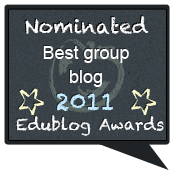Recently, I had the distinct pleasure of interviewing on Skype five students from Perkins High School in Sandusky, OH. This interview gave me a different perspective on the role of inquiry in our classrooms and how it can and should be applied to authentic issues in our communities.
These students, led by their teacher, Tim Obergefell, are part of a long-range study of how we can assess students’ growth in the 21st century skills of inquiry, problem solving, critical/creative and reflective thought. This study follows a previous one focusing upon K-8 educators.
The students, Sabrina, Kathryn, Anne, Matt and Cordell were involved in Tim’s culminating civics course project that gave them the opportunity to identify local issues and problems, propose solutions and share those with local officials. Their projects are illustrative of the kinds of work that our future leaders will be engaged in–those that require innovation, creativity, critical inquiry and compromise.
The problems they identified, inquired about and worked to solve included a very dangerous intersection near a shopping mall, the lack of good, outdoor and useable basketball facilities in town, and the lack of diagnostic tests for those athletes who might have suffered concussions.

Each was a member of a group who were judging themselves by a set of criteria that included asking good questions, problem solving, collaboration and communications.
I asked them to reflect on what they had learned knowing that this reflective piece is often one we overlook because of pressures of time. Here are the questions I posed:
What were the most important lessons you learned in this two month process?
What have you learned about yourself, as a citizen, as a thinker, a problem solver?
And How might these lessons be applied to other subjects and to your lives in and beyond school.
The most important lessons question is important because no one can predict, through our methods of assessment, what will be significant to our students. Their reflections included the following:
“Money is key. You have to learn how to make a proposed solution cost effective.
Meeting with people who can effect change is important.
Even those in high school can make a difference.
You have to choose something that inspires you. . .that you feel passionate about changing.”
What a lesson to learn in high school–that life’s satisfactions will derive from working at something of your own choosing, about which you feel passionate!
What students learned about themselves is often a difficult reflective question. Not every adult has spent time reflecting on her/his performance to make the most meaning out of it. But I thought the students’ reflections were fascinating:
“I didn’t like arguing with people, especially those higher up than I am. It’s often nerve-wracking.
So long as you have evidence and reasons, [you’ll be OK.] These can be most helpful. When 100% prepared, I felt accomplished.
It was helpful for us to be organized by having our facts and evidence in place before we spoke with those in authority.”
Sabrina had written her reflection log several days earlier, “. . .if you try to find your solutions, even if it took days, you will feel more relaxed and satisfied.”
In other words, do your homework, be prepared with arguments and you may end up convincing others.
Even if you don’t like arguing with others, having the facts give you confidence.”
Matt, who worked on the concussion issue, wrote, “I learned I could actually change my community.”
How significant it is to realize so early on that in this world it not only helps to have your facts, but it also might save lives in the future. Think critically! And, what we also spent time discussing on this Skype call was the importance of seeing the other side of the issue. Students needed to know what the counter-arguments were in order to arrive at effective, viable solutions to their problems.
As for transfer to other school and non-school settings, Kathryn, who worked with Matt on the concussion problem, said “This definitely helps you speak with others professionally.” She and Cordell went on to describe how important was “compromise,” how you learn to add on to the ideas of others, to work toward consensus while maintaining your own values.
Sabrina, who worked on the intersection/accident issue, noted that she improved in asking more “detailed questions” when required and this could be valuable in many settings, being able to probe for more information. This might be called thinking on one’s feet.
Finally, Connor, a student whose journals I had read a few days earlier, concluded with this observation:
“Being a citizen of a community is a wonderful feeling. Changing something for other citizens is even a better feeling.” (Emphasis added)
Inquiry led to all of these reflections on the importance of their projects, on what they learned about themselves and how they can and will make a difference not only in Sandusky, OH but also in our nation and around the globe in the not-too-distant future. All during our conference I kept associating their comments with what occurs and does not occur in the world of adults, sometimes in arguing about issues of national/international importance as well as in the world of work.
How often do we encounter folks who refuse to compromise, who do not command the facts or are unwilling to ask themselves these kinds of good, reflective questions. How often we hear claims with no facts to support them!
As I told the students after this conference, “You are the leaders of our future and I feel most comfortable knowing you will be guiding our fortunes someday.”



